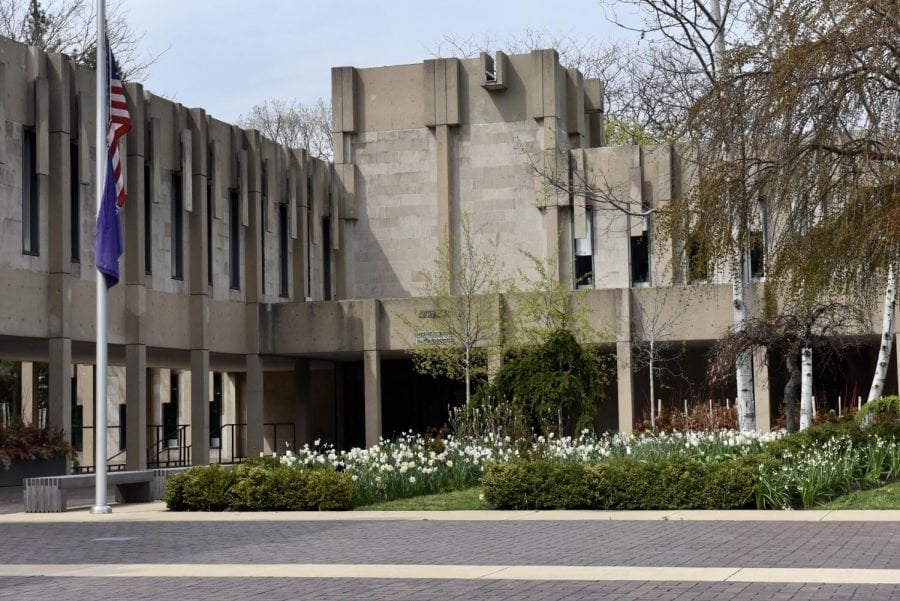Where University President Michael Schill stands on issues of police, freedom of speech and more
Daily file photo by Catherine Buchaniec
University President Michael Schill has an extensive background in higher education, serving as dean of the University of Chicago Law School from 2010 to 2015 and as president of the University of Oregon from 2015 to 2022.
October 16, 2022
University President Michael Schill has an extensive background in higher education, serving as dean of the University of Chicago Law School from 2010 to 2015 and as president of the University of Oregon from 2015 to 2022. During his time at Oregon, he reformed school policy on many fronts, including on-campus policing, diversity and inclusion, financial aid and the right to protest.
Here is where Schill stands on these issues and others.
University Police
In November 2020, Schill reduced the number of armed University of Oregon Police Department officers by 26%. But the same policy increased the number of unarmed Community Service Officers on campus by nine. Schill said CSO officers would wear “easily recognizable” attire instead of police-style uniforms.
“I understand that to some members of our community — particularly people of color — an armed police force generates a feeling of oppression and a lack of safety,” Schill said in a statement to the Oregon community.
Schill also said he would never fully disband the police department. He said the university was trying to balance the need for reform to address police brutality with the need to prevent crime on campus.
Diversity and inclusion
At Oregon, Schill launched the Inclusion, Diversity, Evaluation, Achievement, Leadership framework. Schill said in a news release that the framework, which applies to policies in and out of the classroom, would help the university make diversity, equity and inclusion a reality through increasing diversity in student recruitment and attracting scholars of diverse backgrounds.
In November 2016, Schill and Oregon Senior Vice President and Provost Scott Coltrane encouraged each administrative unit, school and college at the university to create a Diversity Action Plan in line with the goals set in place by the IDEAL framework.
Throughout Schill’s tenure at Oregon, the percentage of undergraduate students of color increased from 25.6% during the 2015-16 academic year to 34.1% during the 2021-22 academic year, according to the university. During the same time period, the percentage of white undergraduate students increased from 59.6% to 61.3%, and the share of undergraduates not from the U.S. decreased from 13.8% to 2.9%.
Financial aid and the endowment
Between 2015 and 2022, Schill nearly doubled Oregon’s endowment, which jumped from about $700 million to $1.3 billion. In comparison, during former University President Morton Schapiro’s 13-year tenure at NU from 2009 to 2022, he more than doubled the University’s endowment from $5.8 billion to $12.2 billion.
During Schill’s tenure at Oregon, he also increased total student financial aid to $43 million.
“What is increasingly important is that people like me, who come from modest backgrounds, have sufficient financial aid, and we make sure as a country that everyone is educated, which opened the world for me,” Schill told the Chicago Tribune.
Schill, a first-generation college graduate, also led a $3.24 billion funding campaign for Oregon. The campaign began prior to Schill’s tenure in 2014, but the university increased its financial goal in 2018. The university raised money for the campaign through 147,000 donors who contributed 552,000 gifts. Funds went toward construction and renovation, student support and faculty and academic programs.
Freedom of speech
During an address by Schill to Oregon in 2017, a group of 45 protesting students, identified as members of “the UO Student Collective,” stormed the stage. The protesters condemned rising tuition fees and an alleged rise of fascism on campus.
Following the event, Schill wrote an op-ed for The New York Times titled “The Misguided Student Crusade Against Fascism.” In the piece, Schill defended freedom of speech and the right to protest, but said it was ironic that the protestors condemned fascism while not allowing his address to continue.
In 2015, Schill met with members of Oregon’s Black Student Task Force after a series of protests calling for increases in hiring of Black faculty members and more courses in Black studies. He said he was able to meet and discuss the group’s demands, resulting in the creation of the Black Cultural Center. Although some members of the task force said they weren’t satisfied with the progress made, Schill said he was glad to see those protests turn into meaningful change.
COVID-19
Similar to other universities across the country, Oregon closed its campus following the initial COVID-19 outbreak. Under Schill, during fall 2020, the university hosted some in-person operations with many restrictions, such as a remote or hybrid model for classes with more than 50 students.
In May 2021, Schill announced the university would require all students and staff to take the COVID-19 vaccine. In December, he added the COVID-19 booster shot as a requirement.
Similar to NU’s COVID-19 protocols, masking was no longer required in most campus spaces at Oregon during spring 2022.
Throughout the pandemic, the university provided free COVID-19 tests and KN95 masks for its students.
Oregon also developed the Corona Corps under Schill. Established in June 2020 in Oregon’s Center for Global Health, the organization partnered with University Health Services to give students opportunities to contribute to the pandemic public health response by assisting with COVID-19 contact tracing in Oregon. The group was renamed the Oregon Public Health Corps in July.
Email: pavanacharya2025@u.northwestern.edu
Twitter: @PavanAcharya02
Related Stories:
— Five things to know about University President Michael Schill
— Q&A: President-elect Michael Schill talks transition to Northwestern, previous experiences
— Rebecca Blank steps down as President-elect after cancer diagnosis, Morton Schapiro to stay on



